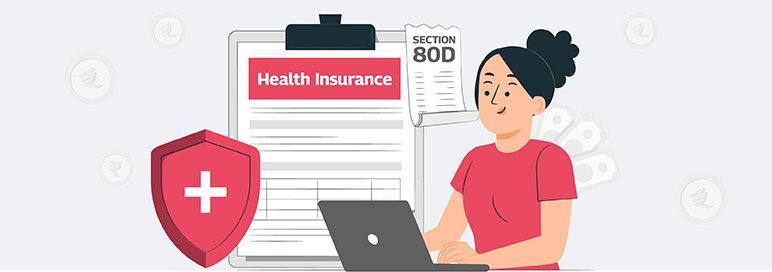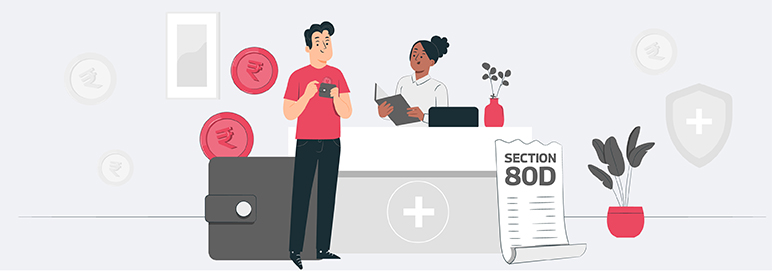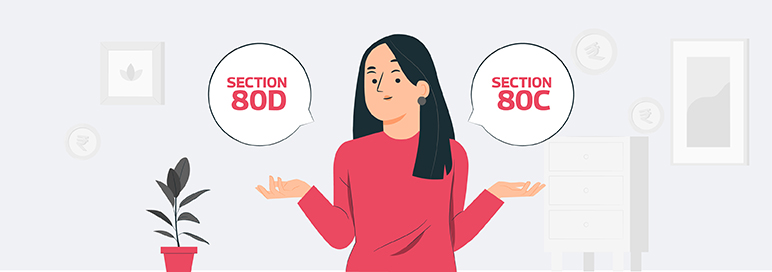Section 80D Tax Benefits: Deductions, Limits, and Eligibility for Health Insurance
Health insurance is a financial protection tool that safeguards an individual from the high costs of medical bills. In India, the government offers tax exemptions to enable citizens through health insurance investments to minimize the cost incurred on acquiring health facilities.

Some sections of the Income Tax Act of 1961 that support the subject matter include Section 80 D where taxpayers claim deductions on premiums paid on health insurance policies. The Indian Income Tax Act under Section 80D provides a deduction to the individual or the HUF [Hindu Undivided Families] for the amount spent on health insurance premiums and the expenses incurred for preventive medical check-ups.
This tax credit encourages people to make arrangements for the welfare of their health and the dependents concerned during medical emergencies. It is crucial to understand the fundamentals of Section 80D as it helps taxpayers minimize their taxable income and be motivated to protect against increasing health expenses.
This tax provision assists both salaried and self-employed professionals in reducing their tax burden and enables them to afford and access health insurance. Most people are aware of the provision of Section 80C under which deduction can be claimed on several investments and expenditures, but not many people are aware of the different provisions under Section 80D.
In this detailed blog, we will explore the features of Section 80D and answer all the relevant queries of the standard. This knowledge will assist taxpayers in making the right decision on their healthcare expenditure and claiming maximum tax benefits while preparing for medical emergencies.
What is Section 80D of the Income Tax Act?
The Income Tax 1961 under Section 80D allows deductions on payments made towards health insurance premiums and expenses incurred on preventive health check-ups. This section highlights strategies that individuals and HUFs can implement to lower their taxable income and obtain insurance against medical risks. Unlike the Section 80C which is a broad section covering all the tax-saving investments and expenses, the Section 80D is confined only to health insurance and medical expenses.

Key Aspects of Section 80D
Deductions on Health Insurance Premiums: Section 80D provides deductions on expenses incurred on health insurance policies for the self, spouse, dependent children, and parents. The policy can be bought from any insurer who has been licensed by the Insurance Regulatory and Development Authority of India (IRDAI).
Preventive Health Check-Up Expenses: In addition to the 80D deductions on health insurance premiums, the standard also provides relief for the expenses of preventive health checkups for the individual and HUF, encouraging taxpayers to proactively manage their health.
Scope and Applicability: This deduction is available in the case of resident individuals, non-resident individuals, and HUFs. However, companies and firms cannot claim deductions under Section 80D as it is only limited to the individuals and HUF concerned.
Deduction Limits: The amount of deduction allowed under section 80D depends on the age of the person being insured and the policyholder’s connection with the service provider. Other additional premium payment reliefs are offered to senior citizens who are sixty years and above.
Exclusions: The deductions do not include expenses on life insurance premiums or other forms of health costs that do not include preventive health check-ups.
The government’s intention of encouraging the adoption of health insurance and the need to practice good health standards are well served by this section as Section 80D deals with health expenses only. This section does more than assist taxpayers in reducing their tax burden. It also assists taxpayers in embracing a culture of annual health checkups and personal financial emergencies.
Eligibility Criteria for Section 80D Tax Deductions
The deductions under section 80D can be claimed only for expenses for medical insurance premiums paid or the amount spent on preventive health check-ups. However, certain conditions must be met before one can claim these deductions. Be sure to review the following eligibility criteria before claiming deductions under Section 80D:
Individuals and HUFs: The medical insurance tax benefits under Section 80D are available to any resident individual, HUF, and non-resident individual. This section does not allow companies or any other entity to claim for deductions.
Relationship with Insured Persons: The policyholder may also claim deductions for health insurance premiums covered by the policyholder’s spouse, dependant children, and parents. However, the premium paid for siblings, in-laws, or other relatives is not recognized for deductions under section 80D.
Age-Based Deduction Limits: Depending on the age of the insured person the value of the deduction is determined. Special consideration is given to senior citizens aged sixty years and above [liable to claim higher deductions]. For instance, if the policyholder and/or parents are senior citizens, the deduction limit is higher.
Dependents and Exclusions: Premiums paid for dependent children only are allowed to be considered. The taxpayer cannot claim deductions on their health insurance premium if the child is financially independent.
Taxpayer Status: Section 80D allows deductions to salaried working professionals and self-employed ones. It does not differentiate between salaried and self-employed taxpayers.

It is important to know the eligibility criteria to avoid disallowance or rejection of taxpayers’ claims on deductions under sec 80D.
How Much Deduction Is Allowed Under Section 80D?
Section 80D states that the amount of deduction permitted shall vary subject to the age of the insured person and their relationship with the taxpayer. Here’s a breakdown of the deduction limits:
Self, Spouse, and Dependent Children: For health insurance premiums, citizens can claim a maximum deduction of ₹25,000 per financial year for insurance of self, spouse, and dependent children. This limit also extends to preventive health check-ups that can be claimed up to ₹5,000.
Parents (Non-Senior Citizens): Additionally, a maximum deduction of ₹25000 can also be claimed from the total medical insurance premiums for parents whose age is below 60 years.
Parents (Senior Citizens): If the taxpayer’s parents are senior citizens (aged 60 or above), the deduction limit rises to ₹50,000 per year for health insurance premiums.
Taxpayer and Spouse as Senior Citizens: In the case, that both the taxpayer and spouse are senior citizens, they can claim a deduction of ₹50,000 in respect of their policy and further ₹50,000 in respect of the policy of parents who are also senior citizens. Therefore, the total deduction benefit is established at ₹1,00,000.
Preventive Health Check-Up Limit: The total deduction of expenses on preventive health check-ups cannot exceed ₹5000. This limit is within the overall Section 80D limit and not an additional benefit.
Here is a tabular representation of the observations listed above:
| Insured Applicants | Tax Benefits [below the age of 60] | Tax Benefits [above the age of 60] |
|---|---|---|
| Self, Children, Spouse | 25,000 | 50,000 |
| Parents | 25,000 | 50,000 |
| Max Deduction | 50,000 | 1,00,000 |
| Preventive Healthcare | 5,000 | 5,000 |
By understanding these limits, taxpayers can optimize their health insurance investments to ensure maximum tax savings under Section 80D.
Section 80D Deductions for Health Insurance Premiums
Section 80D mainly provides tax deductions for health insurance premiums in different types classified by the relationship with the insured person. Here’s how these deductions work:
Self, Spouse, and Dependent Children: Premiums for health insurance of oneself, spouse, and dependent children are allowed major deductions benefits. The maximum allowable deduction under this category is ₹25000 or ₹50000 per year [depending on the concerned candidate’s age].
Parents’ Health Insurance: Taxpayers can also claim deductions for health insurance premiums paid by their parents. If the parents are less than 60 years old, the maximum deduction allowed is ₹25000, in case they are senior citizens, the maximum deduction allowed is ₹50000.
Individual and Family Floater Plans: Section 80D allows deduction regarding individual and family floater policies. Comprehensive policies, which offer health insurance to a whole family in a single policy can also make health insurance easier to manage for tax benefits under Section 80D.
Health Insurance Top-Up Plans: Deduction is also allowed on premiums paid for health insurance top-up plans and super top-up plans for the taxpayers. Such policies are activated when the base cover is used up offering extra protection and monetary cushion.
Taxpayers can make informed choices about the type and scope of health insurance policies to purchase to maximize tax benefits.
Modes of Payment Eligible for Section 80D Deductions
With regard to the payment mode, Section 80D of the Act allows a deduction for only certain modes of payment on health insurance premiums. Here’s a breakdown of eligible and ineligible payment methods:
Banking Channels: Purchases through Internet banking, debit cards, credit cards, and electronic funds transfers [like UPI transactions] are allowed to be claimed as deductions. These modes offer proof of transactions and thus make it easier to claim the deductions.
Cheque Payments: Premiums paid through cheque for health insurance also come under Section 80D deductions. However, post-dated cheques that are cleared after the financial year may not qualify.
Cash Payments for Preventive Health Check-Ups: Expenses for preventive health check-ups may be paid in cash up to ₹5,000 within the overall limit, even though all other premiums should be paid in a non-cash manner to be allowed for deductions.
Ineligible Payment Modes: Payments made in cash except for preventive health check-ups, and the payments made to third parties on behalf of the taxpayer or HUF are not allowed under this section.

Gaining detailed knowledge of these eligible payment modes can assist taxpayers in avoiding problems in claims and receiving the best of Section 80D deduction.
Tax Benefits for Senior Citizens Under Section 80D
Additional tax benefits in health insurance can be relished under Section 80D where senior citizens benefit as they have more healthcare requirements. Here’s an overview of the benefits available to senior citizens:
Increased Deduction Limits: Health insurance is another important area where senior citizens are allowed deductions up to ₹50,000 per year compared to ₹25,000 for other individuals.
Medical Expenditure Deduction: If a senior citizen does not avail of any health insurance, he can claim tax exemption on medical expenses up to ₹50,000. This allowance enables seniors to afford their health costs even if they are not insured.
Combined Limit: This makes it possible for the taxpayer to claim up to ₹1,00,000 if the person concerned is a senior citizen and also paying premiums for senior citizen parents.
Preventive Health Check-Ups: Deductions on preventive health check-ups can also be availed by seniors up to ₹5,000 as a part of the total reimbursement.
These provisions address the special needs of senior citizens in healthcare and ensure that they are provided sufficient monetary assistance for their healthcare needs.
Section 80D Deduction for Preventive Health Check-Ups
Section 80D of the 1961 Act is meant for preventive healthcare that offers various deductions to individuals concerning health check-ups. Here’s how this benefit works:
Deduction Amount: Preventive health check-up expenses of ₹5,000 can be deducted from the overall tax payable amount. This is within the existing Section 80D limit and not an additional allowance, as one might be led to think.
Eligible Family Members: Medical expenditure incurred on the taxpayer, his or her dependent, spouse, children, or parents for the purpose of preventive check-ups can be availed under this deduction.
Cash Payment Allowed: In contrast to the premiums paid for health insurance, expenses for the preventive health check-up can be made in cash. This makes it easy for the taxpayers to claim this particular relief.
Health Benefits: It is important to get a check-up now and then since sometimes health complications may not be easily noticeable. This deduction is appropriate as the government is promoting preventive health care.
This feature makes the taxpayers spend on preventive health care, hence improving overall health and limiting future health bills.
Important Points to Remember When Claiming Section 80D
When claiming deductions under 80D, taxpayers should keep the following points in mind:
Proof of Payment: Invoices, receipts, policies, and bank statements should be kept as evidence of payment made. They may be used during the tax assessment process.
No Double Claims: A taxpayer cannot claim the same amount for Section 80D deductions once they have claimed it under Section 80C.
Separate Deduction Limits: Section 80D has two different limits for self/family and parents. This is because taxpayers should make sure they spend their money wisely in order to get the best tax deduction.
Age-Based Calculations: Deduction restraints depend on the age of the policyholders. Taxpayers have to make sure they calculate limits according to the age of the family members currently.
Third-Party Premiums: Expenses incurred on premiums for siblings, in-laws, any other relatives, or any other close relations cannot be claimed for deductions under Section 80D.
By remembering these points, taxpayers do not make some of the most frequent mistakes when filing for deductions.
Section 80D vs Section 80C: Key Differences
While both Section 80D and Section 80C provide tax-saving benefits, they differ in terms of scope and eligible expenses:

| Factors | Section 80D | Section 80C |
|---|---|---|
| Primary Focus | Section 80D is related to insurance and medical expenses. | Section 80 C is related to several investments like insurance, ELSS, PPF, etc. |
| Deduction Limits | Section 80D allows a maximum deduction of ₹1,00,000 for senior citizens as per the age of the insured person. | Section 80C allows a deduction of up to ₹1,50,000. |
| Scope of Coverage | Section 80D provides the expense of preventive health check-ups. | Section 80C does not have any provision for preventive health check-ups. |
| Eligible Payment Modes | Section 80D has a prescribed method of making payments other than cash, except for preventive health check-ups. | Section 80C permits several payment modes. |
| Flexibility for Health-Related Expenses | Section 80D provides provisions for medical expenses of senior citizens who are not under any insurance. | Section 80C deals with long-term investment products. |
These differences enable taxpayers to be informed on the various privileges accorded to every section and therefore take the right step in investment for tax saving purposes.
Final Overview
Under section 80D, there are significant tax deductions available to the assessees concerning health insurance and preventive health check-up expenses. By understanding the eligibility, limits, and specific provisions, taxpayers can maximize their savings while ensuring robust health coverage for themselves and their families.
